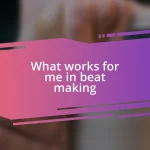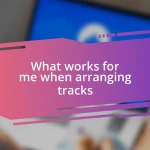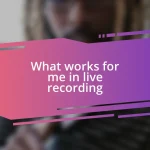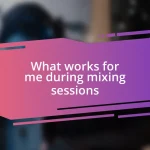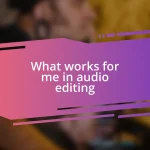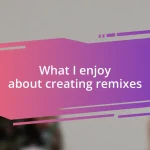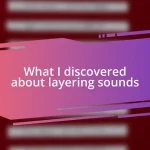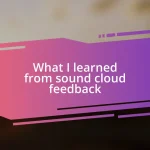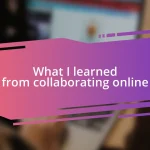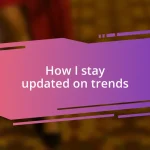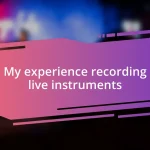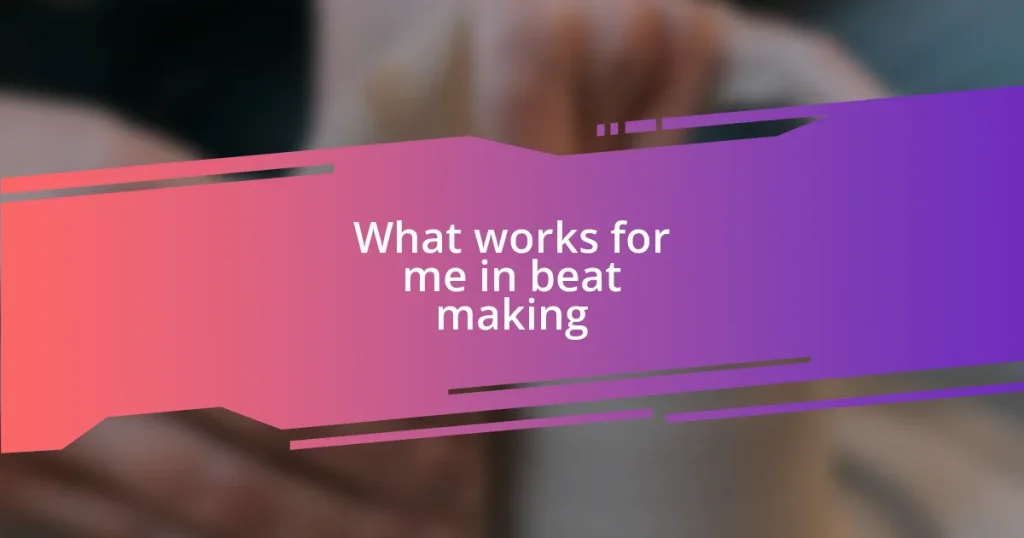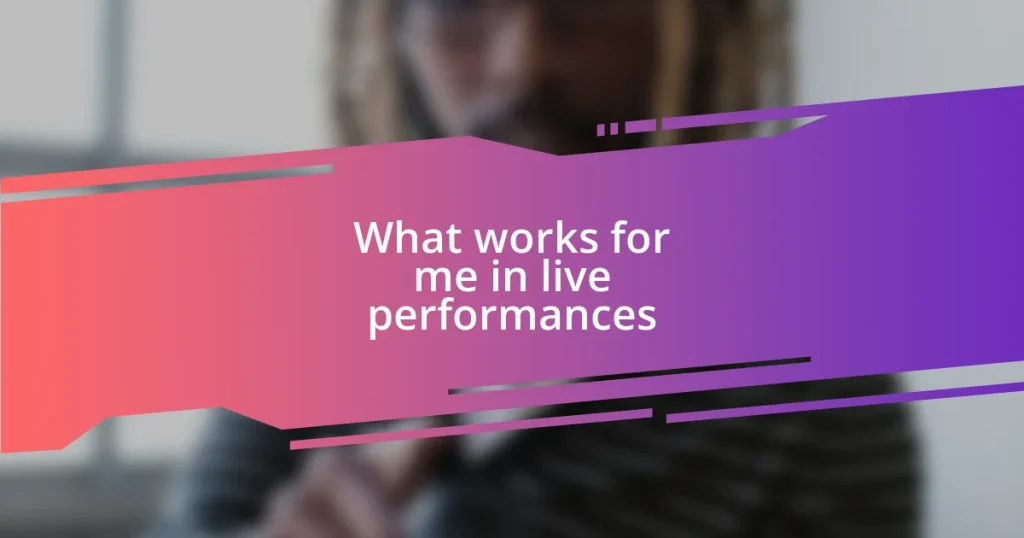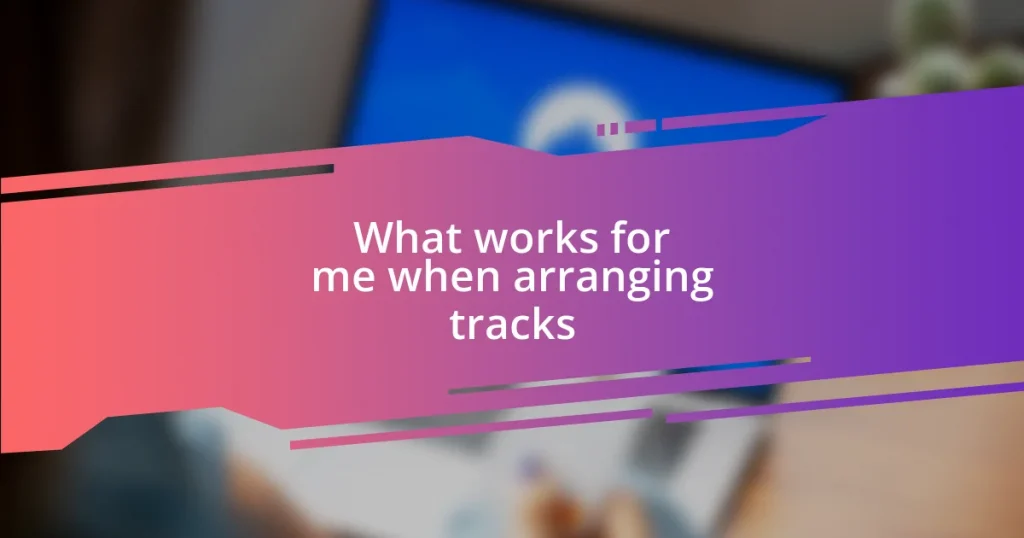Key takeaways:
- Understanding music production requires mastering key concepts like tracking, mixing, and mastering, as well as choosing the right instruments and software tools.
- Collaborating with other artists can enhance creativity and introduce new techniques, fostering a supportive environment for musical exploration.
- Effective marketing strategies, including storytelling and social media engagement, are crucial for connecting with audiences and promoting music in a rapidly changing industry.
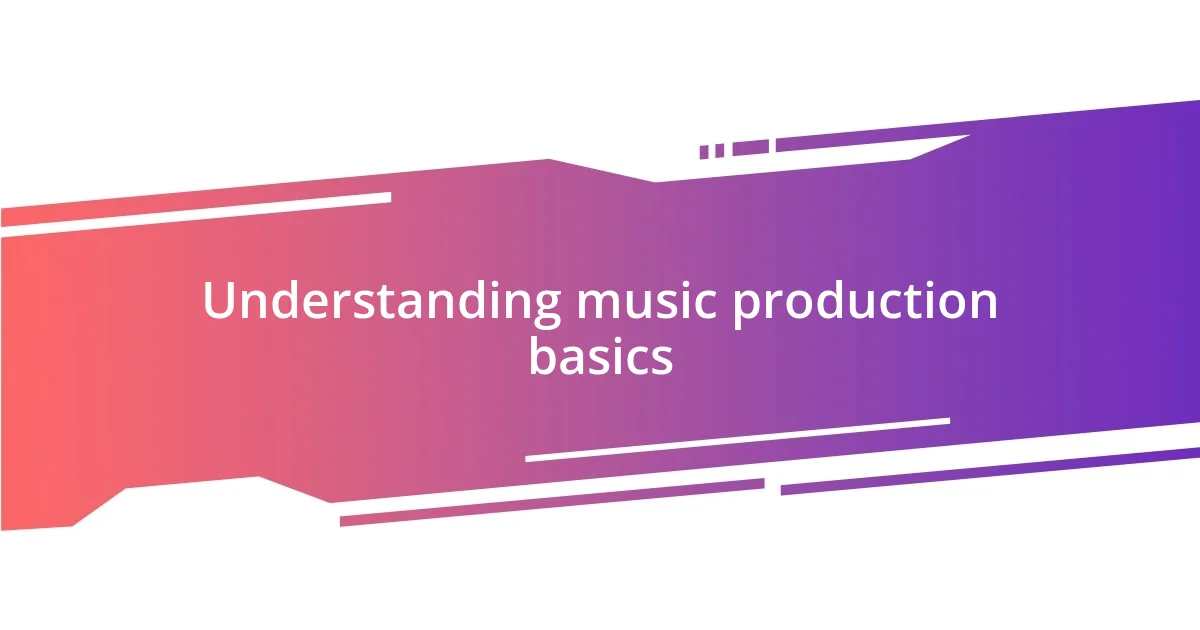
Understanding music production basics
Music production is the art and science of turning creative ideas into polished tracks. I remember the thrill of my first recording session; the moment I hit that record button was both terrifying and exhilarating. It really struck me how layers of sound blend to create something unique, bringing a raw idea to vibrant life.
Understanding key concepts like tracking, mixing, and mastering is essential. Each step plays a crucial role in the final product, almost like assembling a puzzle. Have you ever listened to a song and felt the emotional shift when the chorus hits? That’s the magic of a well-mixed track—each element works in harmony, guiding the listener through an experience.
When I first started, I often overlooked the importance of sound selection. Choosing the right instruments can turn a mediocre song into something extraordinary. Have you considered how much a simple synth patch can change the mood of a piece? This realization helped me appreciate the nuances of music production and deepened my passion for creating immersive soundscapes.
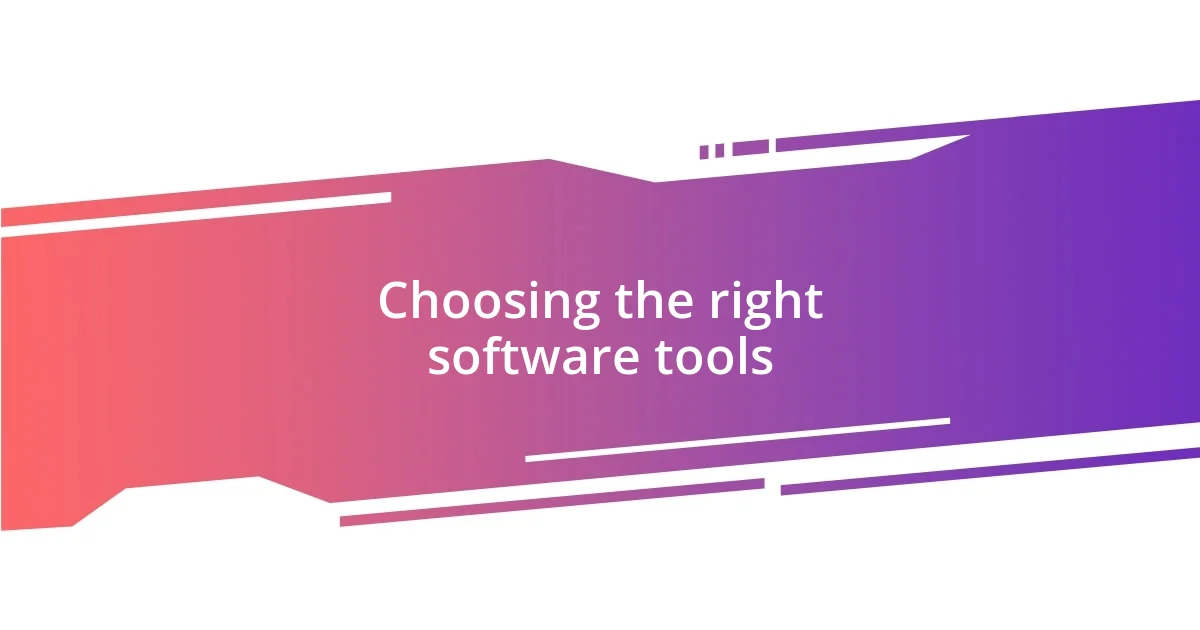
Choosing the right software tools
Choosing the right software tools can be a game-changer in music production. I vividly remember when I switched from a basic program to a more advanced digital audio workstation (DAW). The difference was night and day! Suddenly, I had access to more features and a greater range of plugins that allowed my creativity to flourish. It’s amazing how the right tools can not just aid your workflow, but also expand your artistic expression.
When deciding which software to use, think about your needs and experience level. Some DAWs are user-friendly and perfect for beginners, while others cater to experienced producers looking for more complex capabilities. I started with a simpler option and gradually moved to more sophisticated software as my skills evolved. It’s almost like leveling up in a video game; each step came with new challenges and rewards that kept me motivated.
Another important aspect to consider is the compatibility with other tools you may want to use. I once faced a situation where a plugin I loved didn’t sync well with my DAW, which was frustrating. To avoid this, always check that your chosen software integrates seamlessly with any additional equipment you use, from MIDI controllers to audio interfaces. This foresight can save you time and headaches down the road.
| Software | Ideal For | Key Features |
|---|---|---|
| Ableton Live | Live performance, Electronic music | Session View for improvisation Extensive plugin support |
| Pro Tools | Professional audio editing | Industry standard Advanced mixing capabilities |
| GarageBand | Beginners, Mac users | User-friendly interface Bass and guitar amps |
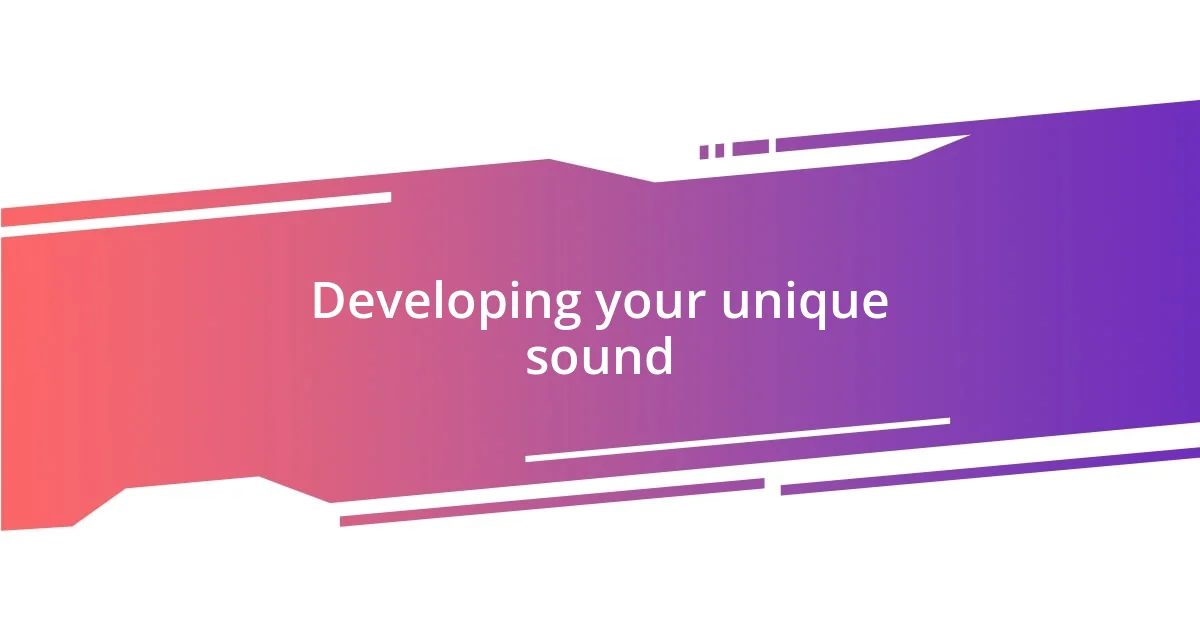
Developing your unique sound
Developing your unique sound
Finding your unique sound is like embarking on a personal journey. I recall spending countless hours experimenting with different genres and styles, often feeling overwhelmed by the sheer variety available. But it was in those moments of trial and error that I stumbled upon the elements that truly resonated with me—emotions that were waiting to be expressed through my music. When you dig deep into what inspires you, your individuality begins to shine through.
To cultivate your distinct sound, consider these key aspects:
- Identify Influences: Reflect on artists whose music excites you. What about their sound do you love?
- Experiment Widely: Allow yourself to dabble in different genres and techniques. Some unexpected combinations may lead to breakthroughs.
- Embrace Imperfection: Sometimes, the quirks in your music can become its most memorable attributes. I once released a track where a guitar glitch became a signature sound!
- Collaborate with Others: Working with diverse musicians can challenge your perspective and encourage you to blend styles.
- Record Your Ideas: Always keep a notebook or voice recorder handy. I’ve found that my most spontaneous ideas often turn into my favorite tracks.
Ultimately, developing a unique sound is about connecting with your true self and expressing it authentically. Take your time and enjoy the process—each step you take will get you closer to uncovering your musical identity.
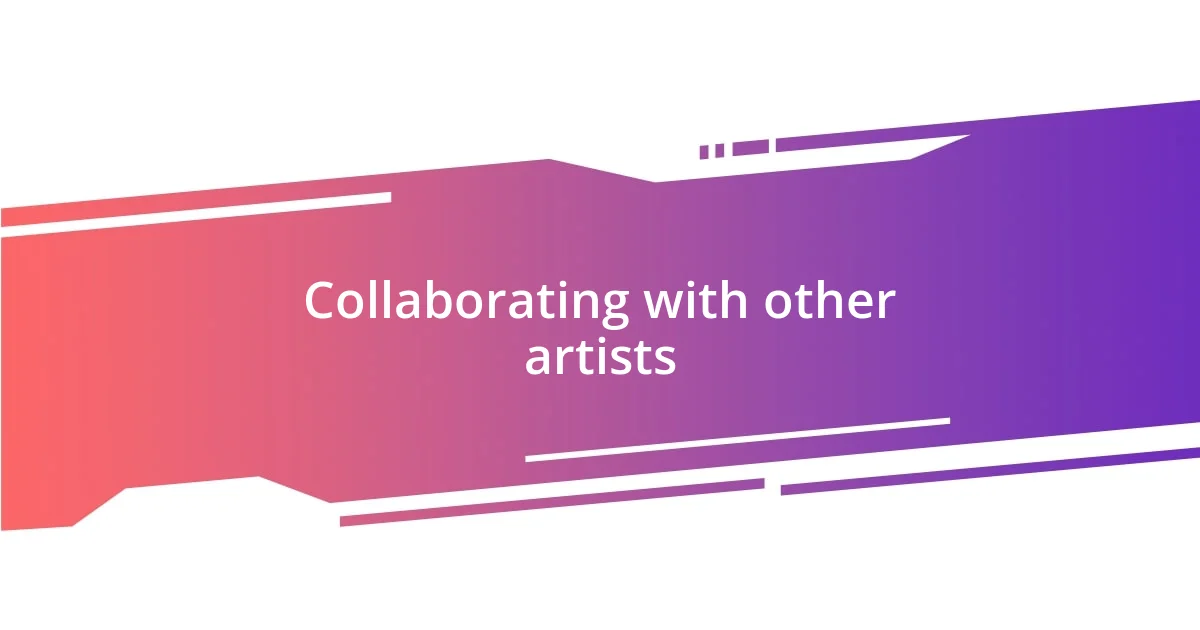
Collaborating with other artists
Collaborating with other artists can completely reshape your creative process. I’ve found that being in a room with someone who brings a different perspective can spark ideas I never thought I’d consider. For instance, I once worked with a singer-songwriter who insisted we use live instruments instead of digital sounds. Initially hesitant, I discovered a warmth in our track that transcended what I could have created alone. Does collaborating push your boundaries as much as it does mine?
Building rapport is essential when working with others. I remember a session where the vibe was just right; we all felt free to share our thoughts and try out wild ideas. It’s in those moments of trust that the magic truly happens. Have you ever experienced that unspoken connection during a session? When everyone is open, that’s when the best music emerges.
In my experience, each collaboration teaches valuable lessons about different genres and techniques. I often find myself learning something very new, just by watching another artist’s workflow. I vividly recall how my workflow changed entirely after working with a DJ. His approach to layering sounds opened up a new dimension in my production style. Isn’t it fascinating how sharing knowledge can help you evolve as an artist?
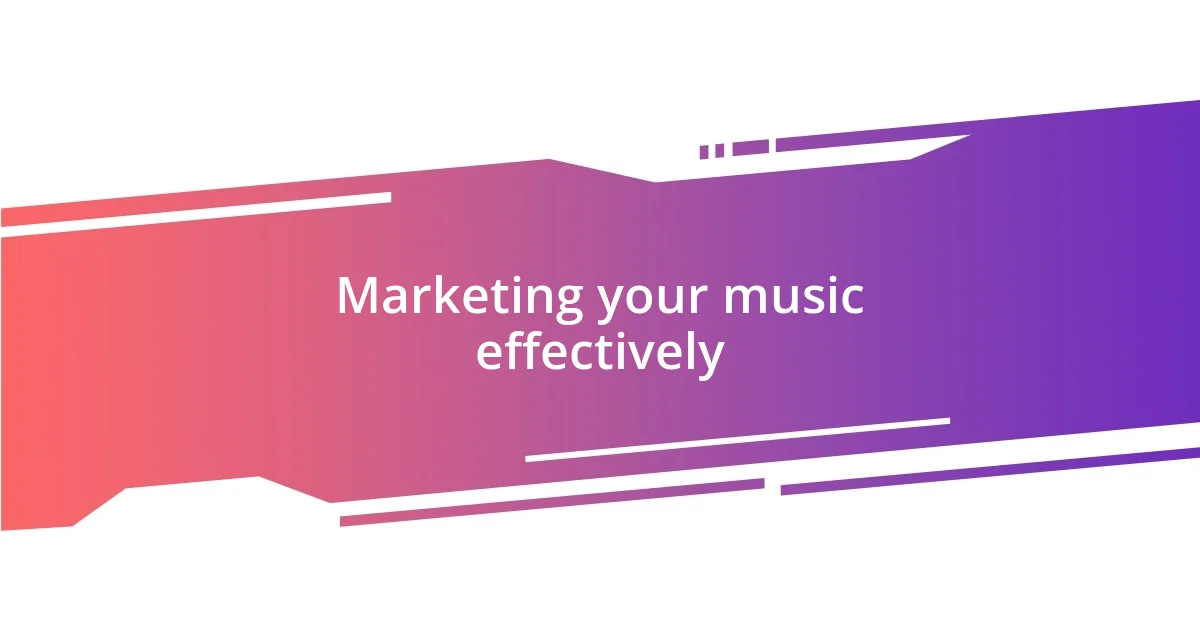
Marketing your music effectively
Effective marketing in the music industry is crucial for getting your work out there. I remember when I first shared my tracks online and felt that rush of excitement mixed with anxiety. Would anyone listen? Discovering social media platforms like Instagram and TikTok changed everything for me. Engaging with my audience through short, honest updates about my creative process made them feel connected, and their feedback became invaluable.
Creating a pressing narrative around your music can captivate potential listeners. I learned that sharing snippets of my songwriting journey—like the late nights spent perfecting a beat or the emotional story behind a particular track—often resonated more than the music itself. Think about it: aren’t we all drawn to the stories behind the art? Engaging visuals and honest narratives can transform a simple song release into a compelling event.
A well-timed release strategy can amplify your reach as well. I once experimented with a teaser campaign leading up to my single launch, sharing little clues on what was to come. This generated buzz and curiosity among my followers. The result? My release received far more attention than it would have with a traditional approach. How do you create excitement for your music? Utilizing innovative strategies can turn your efforts into effective marketing tools, allowing your sound to find its rightful audience.
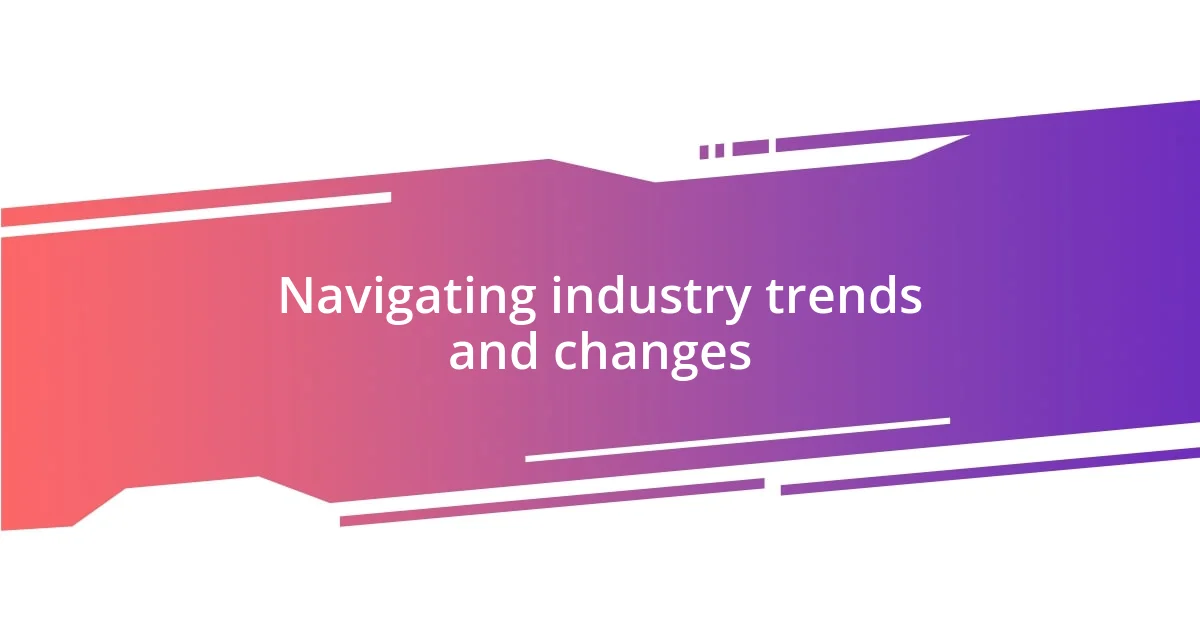
Navigating industry trends and changes
Changes in the music industry can feel overwhelming at times, especially with the rapid evolution of technology and listening habits. I recall a moment when streaming services completely transformed how I approached production. I started focusing more on singles rather than whole albums, understanding that playlists now dictate listener experiences. Have you adapted to these changes in your own music journey?
Keeping an eye on emerging genres is another way to navigate industry trends. I remember stumbling upon a genre fusion that blended elements of jazz and electronic music, which inspired me to experiment with my sound. It reminded me that listening closely to what’s happening around us can unlock new paths in our artistry. Isn’t it exciting to think that the next big trend might be just around the corner, ready to influence your next track?
Networking has become a vital part of staying relevant in this ever-changing landscape. I once attended a virtual conference where I connected with producers and artists working on the forefront of new technology in music. The discussions around artificial intelligence in sound design were eye-opening. It made me realize that embracing these tools could refine my craft even further. Have you ever considered how emerging technology might enhance your music production?
